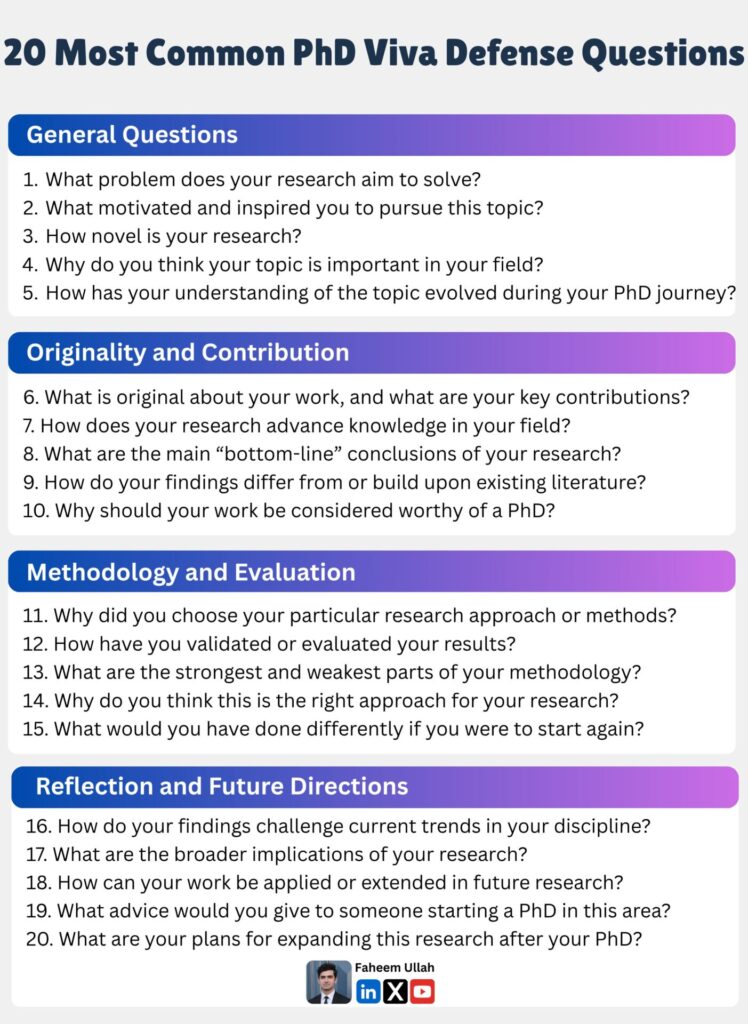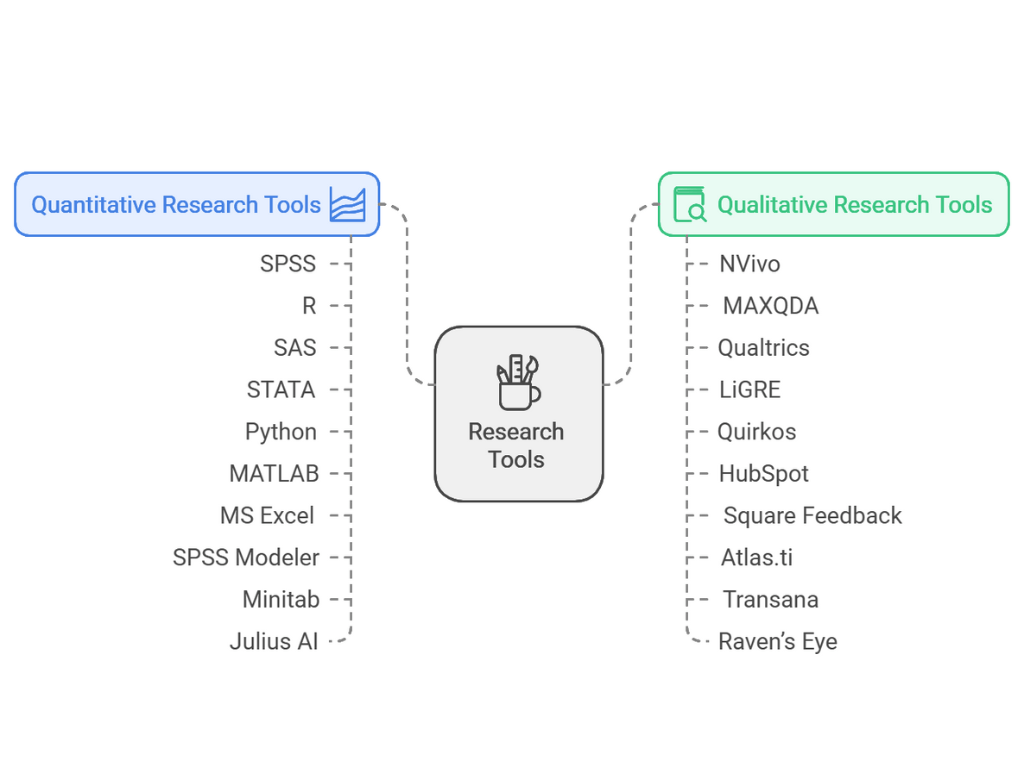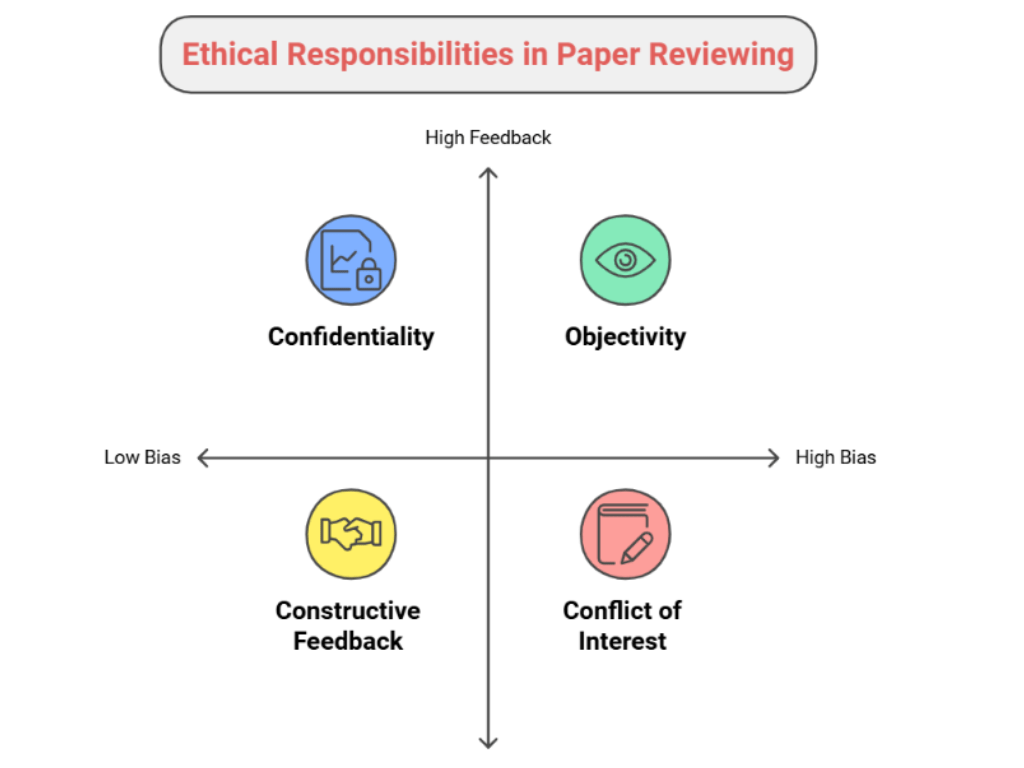
Are you planning to do a literature review?
Try SciSpace Agent
SciSpace will do 3 things for you.
- Identify papers for your literature review
- Extract data from those papers for your literature review
- Create an initial draft of your literature review
The PhD defense is one of the most important milestones in your academic journey.
It’s the day when you finally explain, defend, and reflect on years of research work.
But for most students, the viva is also the most nerve-wracking experience.
You don’t know what the examiners will ask.
You’re unsure what level of detail they expect.
And you’re probably wondering — how can I prepare better?
Don’t worry.
Here are 20 real questions that PhD students are commonly asked in their defense.
Let’s walk through them — section by section — with a few insights on how to answer confidently.

General Questions
These are warm-up questions.
They help examiners understand your research journey and motivations.
1. What exact problem did you solve?
Be clear and concise. Explain the problem in one or two sentences. Avoid jargon.
You should show that you understand the core of your work.
2. What motivated you to solve this problem?
Every great research starts with a reason. Maybe it was a gap in literature, a real-world issue, or a curiosity.
Share your motivation honestly — it makes your story powerful.
3. How novel is your research?
Examiners want to see what’s new. Highlight what makes your work stand out — a new method, dataset, model, or framework.
4. What’s the importance of this research?
Explain how your findings contribute — to academia, industry, or society.
This shows your research is not just theoretical, but meaningful.
5. How has your understanding of the topic evolved?
This question tests reflection.
Show growth — how your views changed from the proposal to the final thesis.
Be open about what you learned along the way.
Originality and Contributions
This section focuses on your intellectual contribution.
It’s your chance to show that your work deserves a PhD.
6. What is original about your research?
Highlight your unique approach, data, or insights.
Remember, originality doesn’t always mean inventing something completely new — it can be improving or combining existing ideas in new ways
7. How has your research advanced knowledge?
Explain how your work adds value to your field.
For example, does it answer a question no one has answered before?
Does it provide a new perspective?
8. What are your key findings?
Keep this answer simple and clear.
Mention 3–4 main findings, and what each means for your field.
9. How do your findings differ from existing studies?
Compare your results with the literature.
Show that you’ve done your homework and understand where your work fits in.
10. Why is your work worthy of a PhD?
This is your time to shine.
Explain the depth of your research, the rigor of your analysis, and the impact of your findings.
Methodology and Evaluation
Now the examiners will dig deeper.
They want to understand your choices, your reasoning, and your process.
11. Why did you choose this specific research methodology?
Every method has pros and cons.
Explain why your chosen method was best suited to answer your research question.
12. How did you evaluate your approach?
Describe how you tested your results — experiments, surveys, validation methods, or case studies.
Show that your findings are trustworthy.
13. What are the strengths and weaknesses of your methodology?
Be honest. No method is perfect.
Show that you understand its limitations and how you minimized them.
14. What would you have done differently?
This question tests humility and critical thinking.
Reflect on what you’d change if you had more time or resources.
15. Why do you think your approach was the right one?
Reinforce your research design.
Show how it aligns with your objectives and why it provided the best results.
Reflection and Future Direction
This is where you show maturity as a researcher.
Examiners want to know that you can reflect and think ahead.
16. How do your findings challenge current trends?
Show how your results question existing theories or practices.
Did your work reveal something surprising or unexpected?
17. What are the implications of your research?
Discuss how your findings can be applied — in policy, education, technology, or future research.
Make it clear why your work matters.
18. How can your work be extended in the future?
No research is ever complete.
Suggest future studies, improvements, or collaborations that could build on your work.
19. Any advice for future PhD students in this area?
This is a reflective question.
Share what you wish you had known earlier — tips, challenges, or lessons learned.
20. What are your future plans for this research?
Explain whether you plan to publish, expand the work, or take it into practice.
This shows your commitment to long-term impact.
Final Tips to Prepare
Answering these 20 questions requires more than memorization.
It requires understanding your research deeply and being able to explain it simply.
Here are a few quick tips to prepare for your viva:
- Practice aloud. Record yourself answering these questions. You’ll quickly spot where you need clarity.
- Simplify your language. Examiners appreciate clarity over complexity.
- Use evidence. Support your answers with data, references, or results.
- Stay calm. It’s not an interrogation. It’s a scholarly discussion.
- Be honest. If you don’t know something, admit it. No one expects perfection.
- Know your thesis inside out. You should be able to summarize each chapter in one sentence.
- Expect follow-up questions. Examiners may dig deeper after your first answer. Stay flexible.
- Revise your literature review. Be ready to discuss how your work fits into existing research.
- Discuss your limitations. They show that you can critically assess your own work.
- End with confidence. Conclude your defense with a clear statement of what your research achieved.
Final thoughts
The viva is not meant to break you — it’s meant to show your readiness to join the community of scholars.
Every question is an opportunity to demonstrate your understanding, confidence, and ownership of your research.
Remember: you’ve already done the hard part — the years of research, analysis, and writing.
Now, it’s time to share your story clearly and confidently.
So take a deep breath.
Go through these 20 questions one by one.
And walk into your defense with the mindset of an expert — because that’s exactly what you are.
Don’t forget to read: AI Tools for Literature Review
Best of Luck..




